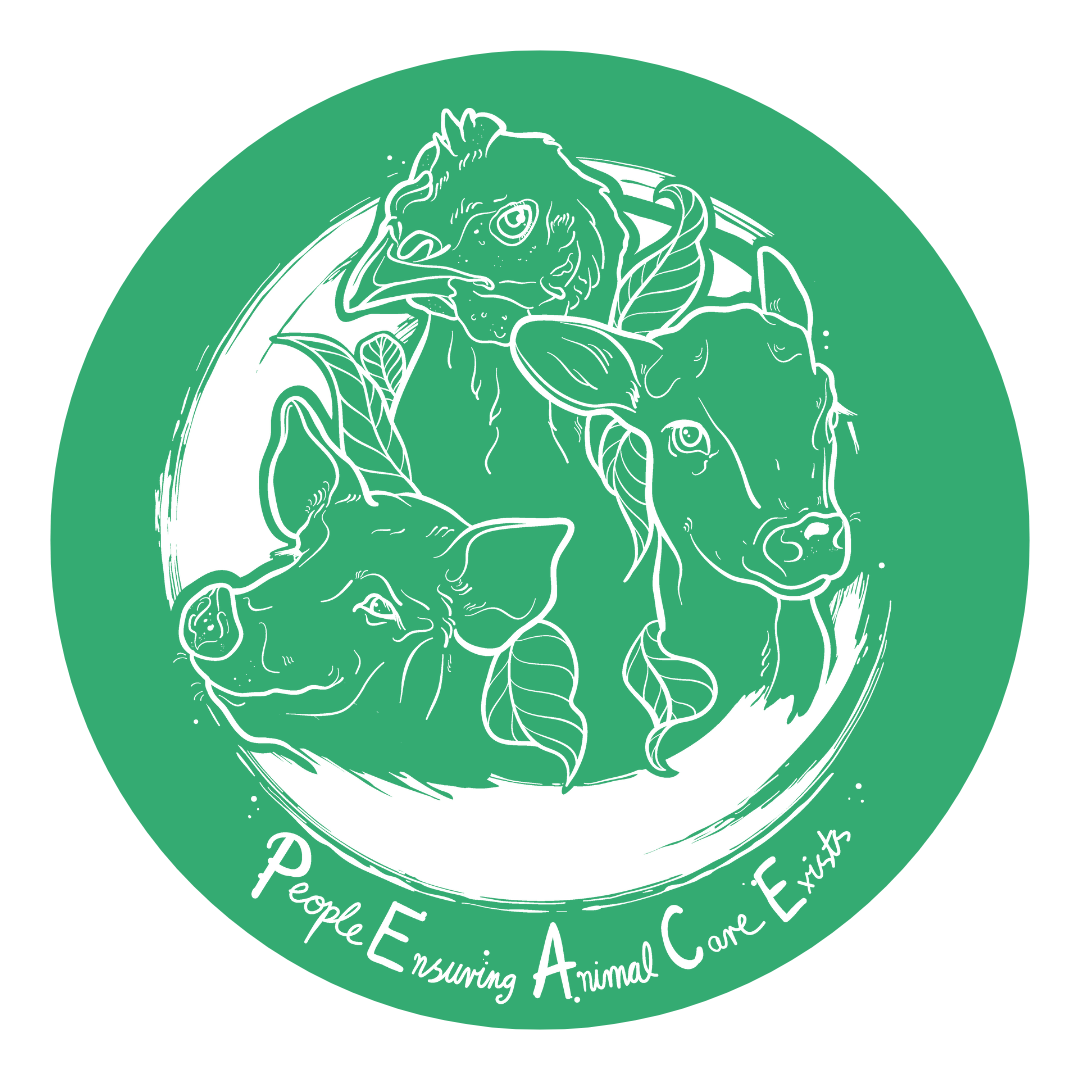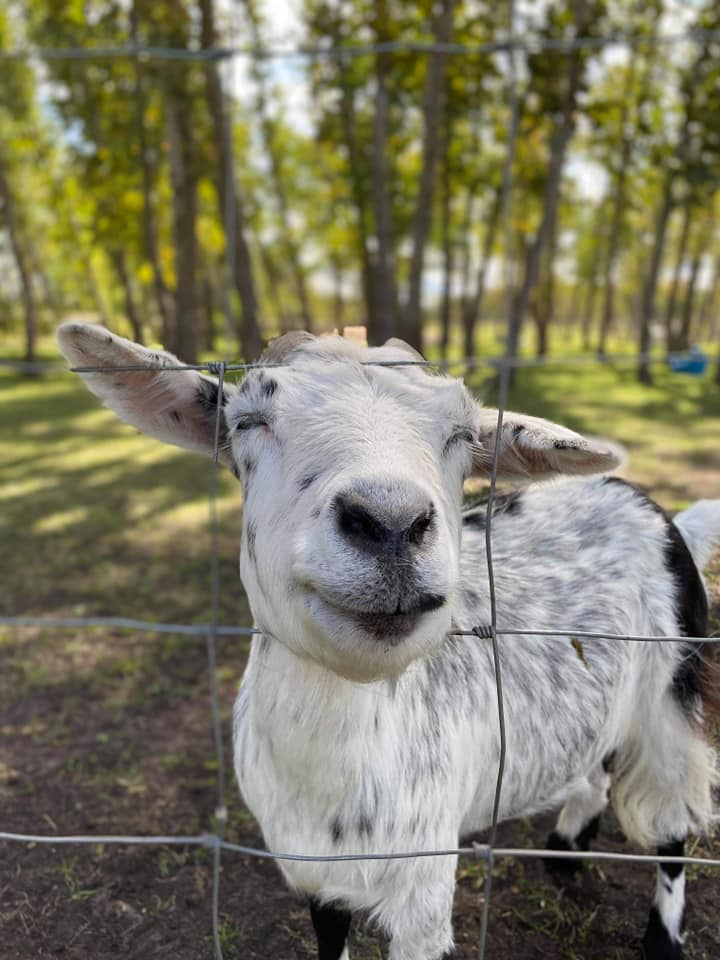Article By Taryn Szedlak
Kismet Creek Farm is proof you can turn a working farm into an animal sanctuary. Founded in May 2014 in Steinbach, Manitoba, Raelle moved from British Columbia to Manitoba to live on her then-fiancé, Karl’s, farm. It had been a working farm for over a century, and Karl’s dad still had free-range beef cattle on the land. Karl and Raelle attended a local livestock auction, where Karl’s dad worked, and seeing all the animals there completely broke their hearts. “We brought home a box of tiny Silkie chicks and that started it all,” says Raelle.
Karl grew up on dairy and beef farms and many of his friends and family were farmers. Raelle grew up in Haida Gwaii and northern Vancouver Island, so her experience with farmed animals was more limited, but she had always been drawn to animals and grew up with many different kinds of pets.
“I have a very clear memory of telling my mom that when I grew up, I would run a rescue ranch, and save all the animals no one wanted anymore. I’d have a little house beside my vet hospital, a blonde daughter, but no husband because I didn’t need one. We still laugh about that chat to this day! It took three decades, but I eventually got pretty close to that vision.”
However, restructuring a farm into a sanctuary wasn’t easy. Proper housing was lacking for certain species and would need to be set up. Luckily, Karl was a master at fencing, maintenance, and tractor driving. And Raelle’s training as a veterinary nurse helped immensely with their resident’s medical needs, as well as things like disease prevention and biosecurity.
Even with her background, Raelle suggests it’s important to do as much research as you can; not knowing what you’re getting into leads to mistakes, wasted money, and heartache. She explains it’s good to volunteer at an existing sanctuary or sanctuaries first, as experience is important. Each species will have different behaviour and needs. A new sanctuary needs to figure out finances, insurance, liability, and find a good vet and a reliable hay supplier. “Then there’s things no one thinks of, like proper disposal of all the manure and bedding, how you will handle animals passing away, criticism or even outright attacks from the public who don’t agree with veganism or farmed animal rescue; there’s so much,” says Raelle.
Kismet’s former volunteers Jen Allen, Jenni Morin, and Robyn Ingram recently started their own farm sanctuaries in Manitoba: The Good Place, and The Rainbow Ranger Station. “I am so proud of them and admire them more than they know”.
Before moving to the prairies, Raelle’s rescue work was with dogs, cats, and smaller animals. Her uncle had a dairy farm for decades. She loved visiting and felt the country life suited her, so it was a natural fit for Raelle to take over an 80-acre beef ranch and turn it into a sanctuary. “Luckily I had an encouraging partner!” says Raelle. She also met a phenomenal community of like-minded people that has offered so much support. In turn, Raelle started helping others transition to a vegan lifestyle.
[gdgallery_gallery id_gallery=”53″]
Speaking of supportive communities, Raelle has many inspirations. Her biggest is Ellie Laks, founder of The Gentle Barn. “She is the epitome of what an animal rescuer should be, and I absolutely adore her. Meeting her in Winnipeg last year at VegFest was utterly surreal. She is a kindred spirit and such a beautiful person,” Raelle gushes. She also greatly admires her friends Carrie, Melissa, and Janeane, the women who founded Home Free Farm, F.A.R.R.M., and The Alice Sanctuary, respectively. “They are my sounding board, my virtual shoulder to cry on, and my light. There are countless others who are fighting daily to end animal oppression, share the stories, and make our world a safer and more loving place. I’m grateful to all of them”. Others include Renee King-Sonnen, Jessica Scott-Reid, Gene Baur, John and Tracy Stewart, Pam Ahern, John Rush, Jann Arden, and members of Animal Save movements across Canada.
It was also moving to Manitoba that made Raelle go vegan. Raelle says Manitoba is a province founded on and driven by animal agriculture, and the realities of the industry are inescapable. When she knew what she was supporting, she stopped. “Once I realized my childhood dream of starting a farm sanctuary, and these beautiful rescue animals started coming, I knew it wasn’t enough just to help them one by one. I had to walk the walk, talk the talk, and lead by example to help others reduce their consumption of animal products too”, says Raelle.
She wants people to know that a vegan lifestyle is not restrictive. Raelle admits she had misconceptions when she was an omnivore, such as that you have to give up the food you loved, sacrificing flavour and convenience, etc., and that vegan products would be hard to find and more expensive. But that wasn’t the case. She has found that veganism is accessible to most people in developed nations. She says she is more adventurous in her eating now too.
“While there certainly can be geographical, financial, or cultural challenges with veganism, it’s still far more achievable and maintainable than most think. You just need the right information and support,” Raelle says. She can’t remember the last time she has been sick, and her nearly four-year-old son who has been vegan since birth has never had an ear infection, croup, or the flu.
“But most of all, you’ll start to feel this amazing sense of inner peace because you can now truly mean it when you say you love animals, or you care about the environment. When your actions are in alignment with your beliefs, something beautiful happens. Being vegan has made me softer, kinder, more empathetic, and more compassionate. Doesn’t the world need more of that?”
Raelle recalls one of her rescues that will stay with her forever. She and Karl were contacted in the fall of 2019 by a derelict petting zoo that hadn’t been operational in years. The owner, an elderly woman, had gone into the hospital and no one was there to take care of the animals except for neighbours when they could. The petting zoo had been struggling for years and the owner was not capable of keeping up with financial and physical responsibilities. When Raelle got permission to enter the property, she said the conditions were so shocking and unbelievable, she had nightmares and was depressed for months afterward. “So many animals had been suffering for a long time. There was no food, no water. Animals were emaciated. Shelters were crumbling to pieces”.
[gdgallery_gallery id_gallery=”54″]
After the animals were assessed and fed, new homes were found for them. Unfortunately, after another family member got involved the animals were surrendered to the province. She was able to save only Buddy the pig and Dexter the steer. She had promised Buddy next time she saw him, she wouldn’t leave him behind; and she didn’t. Because of Buddy’s and Dexter’s ages and poor body conditions, the Animal Control officer wanted to euthanize them. But Raelle and Karl fought for them, and Buddy and Dexter were able to live out their lives, peacefully and loved, at Kismet Creek Farm.
Karl and Raelle realized the property could be more than just the sanctuary. Other aspects such as a campground, hiking trails, orchard etc, could help fund the rescue work. Choosing the name took months of brainstorming, and googling what was already taken. One day as Raelle was scribbling down ideas, she wrote “Kismet”. It had always been one of her favorite words, and Karl liked it too, so they registered it. “Creek” was added because the creek is Karl’s favourite part of the property.
“Everything about how we met and started this place is meant to be. Every animal that comes there was meant to. Kismet is a series of little events that seem unconnected but lead you somewhere amazing. That’s why we chose it,” says Raelle.
Raelle and Karl officially separated in September 2020, but will continue to run the sanctuary together and take care of nearly 100 “farm kids”. More plans for the future include expanding the pig’s area to give them forest space, completing the new rabbit area, and planting sunflowers and pumpkins so families can come in Autumn for an outdoor experience. But that’s not all! They have designed a medical treatment area, and a new poultry barn that will house pot-bellied pigs as well.. They are also talking about creating hiking trails, possibly yurts, and a campground setting. Something Raelle is very proud of is their gift shop, which she wants to expand. It carries vegan products made locally by female entrepreneurs. “I also want to start hosting full-day wellness retreats and music shows in the summer. The more ways we come up with to successfully generate revenue, the more lives we can save,” says Raelle.
“All in all, I’m proud of how we started and how we grew. We aren’t perfect, and we’re really hard on ourselves sometimes. But we are constantly learning and improving.”
TO FIND OUT MORE ABOUT AND/OR SUPPORT kismet creek FARM SANCTUARY visit their:
Website | Facebook | Instagram | YouTube | Donate
[gdgallery_gallery id_gallery=”55″]

